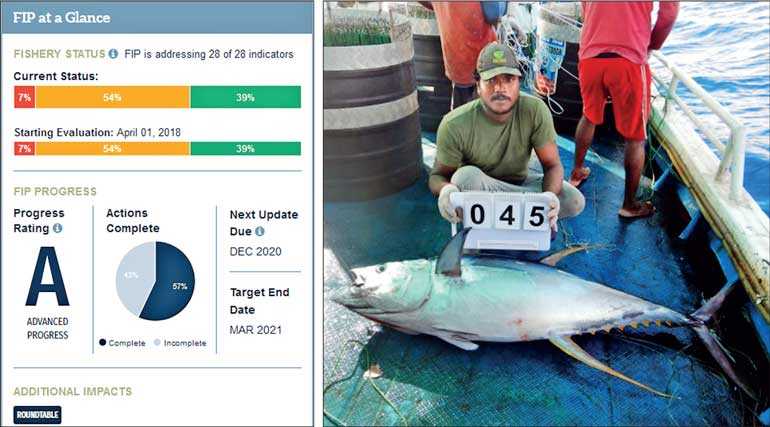Tuesday Feb 24, 2026
Tuesday Feb 24, 2026
Wednesday, 8 July 2020 00:00 - - {{hitsCtrl.values.hits}}

Fresh (chilled) yellowfin tuna (Thunnus albacares, kelawalla, kilavalai) is Sri Lanka’s premium export product to top tier seafood markets in Japan, Europe, and North America.
Sri Lanka’s leading seafood exporters have been working with the Department of Fisheries and Aquatic Resources (DAFR) since 2017 to add further value to yellowfin tuna products by gaining Marine Stewardship Council (MSC) certification for Sri Lanka’s yellowfin tuna fishery.
The MSC’s Fisheries Standard is the international standard for sustainable fisheries. A team of independent consultant’s review information and data about the fishery’s impact on the stock; on other stocks, on marine habitats and the broader marine ecosystem.
The consultants also evaluate the fishery management measures that are in place to ensure that the fishery will continue to operate at a level equivalent to a biologically and ecologically sustainable fishery, before reaching a decision on certification.
Sri Lanka’s longline yellowfin tuna fishery was first entered for pre assessment against the MSC Fisheries Standard in 2017 by six corporates of the Seafood Exporters’ Association of Sri Lanka (SEASL). Although the fishery failed the pre assessment, the assessment report enabled the SEASL to map out a route to full assessment through the Sri Lanka longline fisheries improvement project (FIP).
Over the past two years six of Sri Lanka’s leading tuna exporters – Ceylon Fresh Seafood Ltd., Global Seafood Ltd., Jay Seafood Processing Ltd., Lihini Seafood Ltd., North West Fishery Ltd. and Tropic Sri Lanka Ltd. – have co-financed actions to collect information and data to improve the fishery’s score against the MSC Fisheries Standard.
The FIP has also received support from SEA PACT a group of leading North American Seafood Companies dedicated to driving stewardship and continuous improvement of social, economic, and environmental responsibility throughout the global seafood supply chain and New England Seafood International Ltd. to drive improvements to Sri Lanka’s longline fishery.
Last week the commitment of Sri Lanka’s leading exporters and the successful implementation of actions by the FIP was recognized by fisheryprogress.org, which gave Sri Lanka’s longline FIP an A Rating for the advanced progress towards to achieving a level equivalent to a sustainably managed fishery.
Seafood Exporters Association of Sri Lanka (SEASL) President and Taprobane Seafoods Ltd. Managing Director Dilan Fernando together with SEASL Secretary and Global Sea Foods Ltd. CEO Sampath Padmawansa commended Dr. Steve Creech on behalf of SEASL for leading the FIP Sri Lanka.
According to the FIP’s Coordinator Dr. Steve Creech, the FIP is on track to collect the information and data needed to flip the fishery to ‘sustainably sourced’ by the end of year.
“If the industry continues to work closely with the department of fisheries and boat owners over the next six months, the Sri Lanka’s longline fishery has a great opportunity to become the first fishery in Sri Lanka and only yellowfin tuna fishery in the Indian Ocean to achieve certification against the MSC Fisheries Standard.”